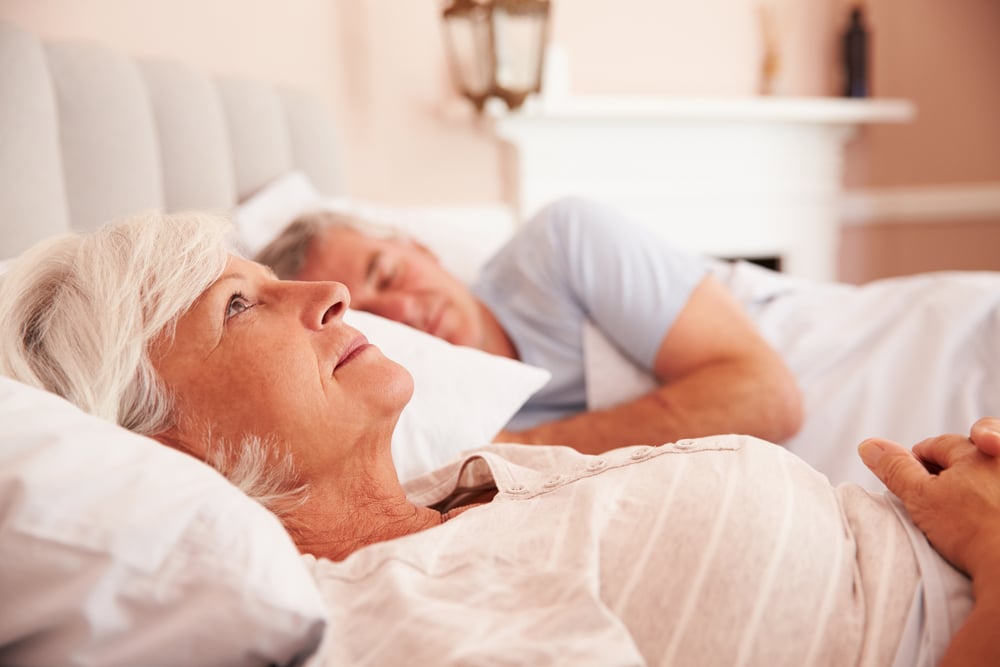What Causes Insomnia?
As the Sleep Foundation indicates, a number of different factors can trigger insomnia. In many cases, a combination of these elements works together to trigger poor sleep. Identifying the factors involved can help you find a solution.
Stress and Mental Health Issues
Being stressed can lead to a state of hyperarousal, which can make sleep challenging. In turn, difficulty sleeping can lead to stress, creating a vicious cycle that makes getting a good night’s sleep harder. In a similar fashion, anxiety and depression can cause serious sleep disturbances. These conditions often set off negative cycles of thinking that keep people awake.
Lifestyle
Lifestyle choices that interfere with the body’s ability to sleep at night can be problematic. These can include excessive napping, eating heavy or spicy meals, or consuming caffeine close to bedtime. Engaging in strenuous exercise or playing stimulating video games close to bedtime can also leave you too energized to fall asleep easily.
Medications
Sleep disturbances are a side effect of many medications. Seniors are especially likely to be affected because they often take multiple medications.
Chronic Pain, Injury, and Physical Illness
Trying to get comfortable enough to sleep when you’re hurting isn’t easy. That’s why the aches and pains that accompany any chronic pain, injury, or physical illness can trigger a bout of insomnia. Again, seniors are more likely to be impacted because they tend to have higher rates of chronic pain and chronic health conditions.
Neurological Conditions
Problems impacting the brain often interfere with the natural sleep cycle. As a result, people with conditions like dementia and Alzheimer’s disease may struggle to navigate the cues of the sleep-wake cycle. This can lead to insomnia.
Sleep Disorders
In some cases, a specific disorder keeps people from sleeping well during the night. Sleep apnea interrupts sleep with temporary breathing lapses. Sleep bruxism involves teeth grinding and clenching.
How Can Insomnia Be Prevented?
Insomnia can make your nights miserable and leave you dragging during the day. Thankfully, there are ways to combat it. Understanding what causes insomnia can help you fight back. For example, if an underlying condition like anxiety, depression, or a sleep disorder is contributing to your insomnia, seeking treatment for the condition may also provide relief for your insomnia. Or, if a medication is causing the problem, talking to your doctor about changing the meds may do the trick.
What if you don’t know why you’re having trouble sleeping? There are also a lot of general steps that anyone who wants to prevent insomnia can try:
- Get up and go to bed at the same time every day. The consistency helps your body know what to expect.
- Create a comfortable sleeping environment.
- Make your bedroom a dark, quiet, cool sanctuary. If possible, keep television and other technology out.
- Avoid large meals late in the evening.
- Do not drink large servings of caffeine or alcohol late in the day.
- Do not smoke or use nicotine.
- Incorporate regular exercise into your daily routine so that you’re tired enough to sleep. When possible, try to go outside. Exposure to the sun can help reinforce your body’s circadian rhythm.
- Avoid or strictly limit naps during the day.
- Turn off cellphones, laptops, and televisions at least 30 minutes before bedtime.
- Create a relaxing evening routine that helps you wind down and prepare to sleep.
A good night’s sleep sets the stage for a successful day. At Kinship Pointe, we’re delighted to offer a variety of activities and events that make it fun and easy for our residents to stay active and engaged.

